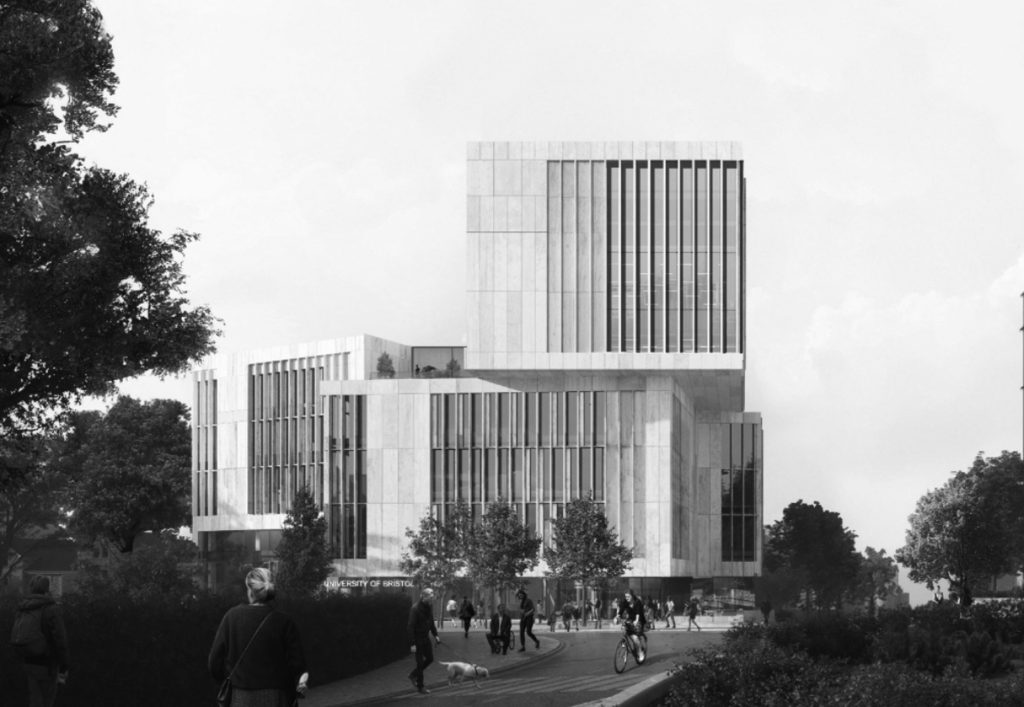Bristol University is building a new library. The very idea is enough to send shivers down the spine: any British institution that decides to build something new is almost certain to add to the accumulated ugliness of the world.

And so it is in this case. The design that the University has accepted combines banality with monstrosity: a combination that, I suppose, requires talent of a kind to achieve. The building already looks a good candidate for demolition, probably within thirty years, and it hasn’t even been built yet. One can only hope that Bristol’s pullers-down of statues will get to work on it straight away: though of course they prefer to demolish only those things which have some aesthetic value.
One of the partners of the architectural partnership that designed the building was reported as having said: “This inspirational new landmark for Bristol will provide world-class facilities in an inclusive and welcoming environment.” It is worth lingering a moment on this horrible sentence.
In the first place, it is not for the designer of a building to say that it inspires anybody or anything, any more than for me to say that this is a good article. That is for others to decide. In fact, the new library will indeed be inspirational: but only of contempt and despair at the aesthetic incompetence, insensibility and egotism of the architects and their client alike who have inflicted such a thing on a city.
That it will be a landmark is, alas, true, for it is so large that it will be visible from all over the city. But being a landmark is not a good in itself, any more than is originality a good in itself. In the absence of aesthetic quality, it is, rather, a fault, and a grave one. I note that even the architect, who is by no means modest, makes no claim of beauty for the proposed building.
Then comes that terrible word that sounds as a tocsin: ‘world-class’. What does world-class mean? It means second-rate, mediocre, boastful, and aspiring to something that is certain not to be reached. Who would say of Chartres, ‘It is a world-class cathedral?’ or of the Taj Mahal, ‘It is a world-class mausoleum’? Even to think in these terms is to have a mind that makes greeting-card poetry seem profound by comparison.
Then comes the teddy-bear word ‘inclusive’ that is supposed bring comfort to the reader and induce a warm glow of approbation of its utterer. Who can be against inclusion? Dr Verwoerd? But who or what is to be included? Biblioclasts? Illiterates? Terrorists? Fascists? Paedophiles? Drunks? Drug dealers? Prostitutes? Pimps? Graffitists? Vandals? Swindlers? Thieves? Murderers? The word ‘inclusive’ is a lie, when it is not shorthand for deeply-ingrained but shallow ideology.
Here is what another partner is reported to have said: “While we set out to create a contemporary design that echoes the sense of civic dignity imbued with timeless sculptural qualities, the new library is deeply contextual and deliberately responsive to the historical environment of Bristol.” This is the kind of language with which anyone who reads architectural writers in our magazines and newspapers is only too familiar. Trying to fix a meaning to it is like trying to grasp the more slippery kind of seaweed. Someone should write a glossary, for example:
Contemporary – Fit for demolition within twenty years
Contextual – Standing out from its surroundings like a
fungating cancer
Responsive to historical environment – Destructive once and for
all of its surroundings.
There is one thing to be said for architects such as those of the new Bristol University library: they reconcile one to one’s advancing age.